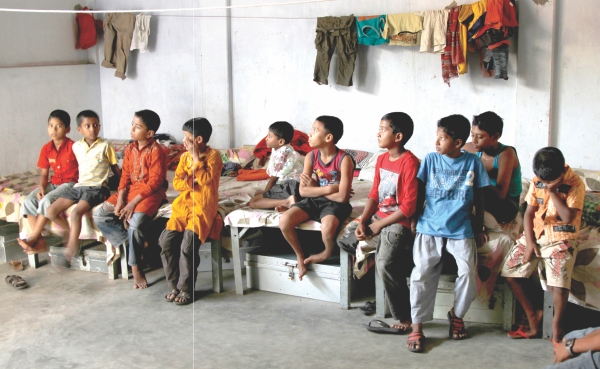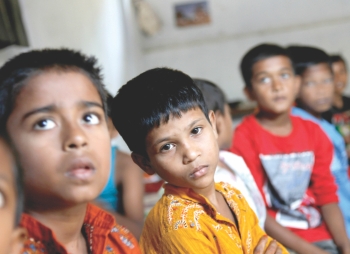| Home - Back Issues - The Team - Contact Us |
 |
| Volume 10 |Issue 44 | November 25, 2011 | |
|
|
Human Rights
Orphans Need More Support Farhana Urmee Altaf, a student of class IX cannot mingle with other boys of his class at Dhaka's New Model High School. The fear of being cornered by the other boys always haunts him. He always sits in the backbench of the class and tries to concentrate only on his lessons. The extra emphasis on learning has certainly paid off in the form of excellent results in the exams. For Altaf this was the only way he could think of to make up for his lack of social skills especially when it came to blending in with the others. He was different in the sense he was deprived of having a father since was only a year old. He was brought up in an institution meant for orphans like him. Altaf Hossain, now a university teacher, was brought up in Sir Salimullah Muslim Orphanage, the oldest one in the subcontinent, being situated in the heart of the capital, gave Altaf the opportunity to have access to better education. Altaf not only survived buts also succeeded. Now, he has become a role model for the rest of the orphan children who are brought up in the orphanages in the country. Currently there are 10,375 orphans staying at government-operated 85 orphanages in the country. In addition, there are 2,759 registered orphanages, getting allocation from government. The Government is currently running 85 Child Care Sarkari Shishu Paribar across the country. For the non-government and autonomous orphanages, the government provides financial assistance called a capitation for the orphanages as an encouragement. Altaf, in his childhood, had to struggle for financial assistance to pursue education in better schools. “I realised that in the orphanage school I could not solve a basic math problem as we didn't have quality teachers there. Again, I never saw any seniors getting exceptional results, which could have inspired me. I worked very hard and thanks to the orphanage authority I was allowed to get enrolled into other schools outside the orphanage,” says Altaf. The Orphanage has two separate schools for boys and girls in the orphanage premises. Moreover, it has separate homes for boys and girls, a baby home, library, Hifzkhana, mosque, health service centre, computer lab, a library and a club.
Altaf also says that during his time in the Orphanage the children did not get proper nutrition. “Things are changing now, for the better. But the education is still a vital concern for the orphan children as high performing students are not coming out from the orphanages.” Regarding the development of the orphanages Nomanul Haque, Superintendent of Sir Salimullah Orphanage complains that other than the government Shishu Paribars most of the orphanages have to depend highly on the donors. Donation is such that you can never guarantee its availability. Orphanages having a Trust of their own, properties earning money yearly and donation are the capital of an orphanage. “The government also provides a capitation grant but that too little to bear the expenses of the inmates of the orphanage,” says Haque. Regarding the capitation provided by the government, Ranjit Kumar Biswas, NDC, Secretary, Ministry of Social Welfare says, “An orphanage may have a maximum grant of 50 percent of the total expenditure for the inmates. It does not necessarily mean that the government will bear 50 per cent of the expenditure of the non-government orphanages at the first jump, which is not feasible. Again, the government always monitors the number of the inmates in an orphanage, pays sudden visits to conduct audit and then grants the capitation.” The government tries to command the humanitarian cause. One should not assume that the non-government orphanages would get the 100 percent capitation grant. Yet, the government is always interested in planning for the welfare of the helpless through a number of social-safety-net programmes. The budgetary allocation and other financial time bound action plans have also the reflection of giving social welfare a priority, Biswas adds. according to the Development Budget 2006 of the Ministry of Social Welfare the project of conversion of Sarkari Shishu Sadan into Shishu Paribars 1994-2006 was given a budget of Tk 15829 lakh. The government runs 85 Shishu Paribar (orphanages) and have the capacity of keeping 10,300 orphans. Of them 43 institutions are allocated for boys, 41 for girls and one for both boys and girls. Again, a total of 51,342 orphans have been rehabilitated through government till date. The government is also operating six Baby Homes in the six divisional cities across the country. If a baby is found abandoned anywhere, the baby can be sent to a Baby Home nearby after filing a General Diary with the nearest Police Station. The Baby Home will take the responsibility of the baby. When the baby becomes six years old, then he or she is sent to the Shishu Paribars. At a Shishu Paribar the child is provided with education, protection and training until he or she is 18 years old. A total of 1037 babies have been rehabilitated till date from the baby homes of Azimpur, Dhaka; Rowfabad, Chittagong; Grater Road, Rajshahi; Bagbari Sylhet; Moheshorpasha, Khulna and Agailjhora, Barisal. The Baby Homes have 525 infants.
However, orphanages often look after the child after 18 as well. The child has to apply to the orphanage authority for providing the support of shelter and food and on the basis of his/her previous track record and for the sake of humanity the authority often lets the applicant stay until he or she becomes self dependent. It is not a regular phenomenon, yet there are instances of orphanages taking care of the children after becoming 18. Sir Salimullah Muslim Orphanage, the oldest one in the subcontinent supports its children by extending help even after the children become adults. The orphanage allows a few students to live in the dormitory and help them to pursue higher education. After its inception in 1909, Sir Salimullah Muslim Orphanage has been supporting orphan children with shelter, food, health service and education. However, the standard of education is not high enough to produce a meritorious student like Altaf. Altaf's case was different as he was not wholly dependent upon the education provided by the orphanage. The orphanage supports its bright students if they want to study in schools or colleges outside of the orphanage. Altaf says that all the children do not get the opportunity to get good results as they do not have good teachers, the orientation of proficient extra-curricular activities and above the all they lack a role model to look up to. Whether run by the government or an non-governmental organisation if the orphanages can pays an extra attention in the study of the inmates and train them according to their interest, the orphanage can produce skilled human resource for the country, thinks Altaf. If the orphan children can be tagged with the cultural and educational activities of Shishu Academy and other institution that might be a new window for the orphan children who remains confines in walls of dormitories. “A good team of teachers who can help the deprived children is needed in orphanages because these children need extra care and affection,” Md Ashraf Ali Sheikh, High School teacher of Sir Salimullah Muslim Orphanage. A good quality teaching facility, scope to perform extra-curricular activities can be the good opening for the children living in the orphanages. Their feeling of deprivation and loneliness in the society can be turned to strength if they are treated as gifts of God, not as a burden. The change can bring hundreds of Altafs in the society.
Copyright (R) thedailystar.net 2011 |
||


